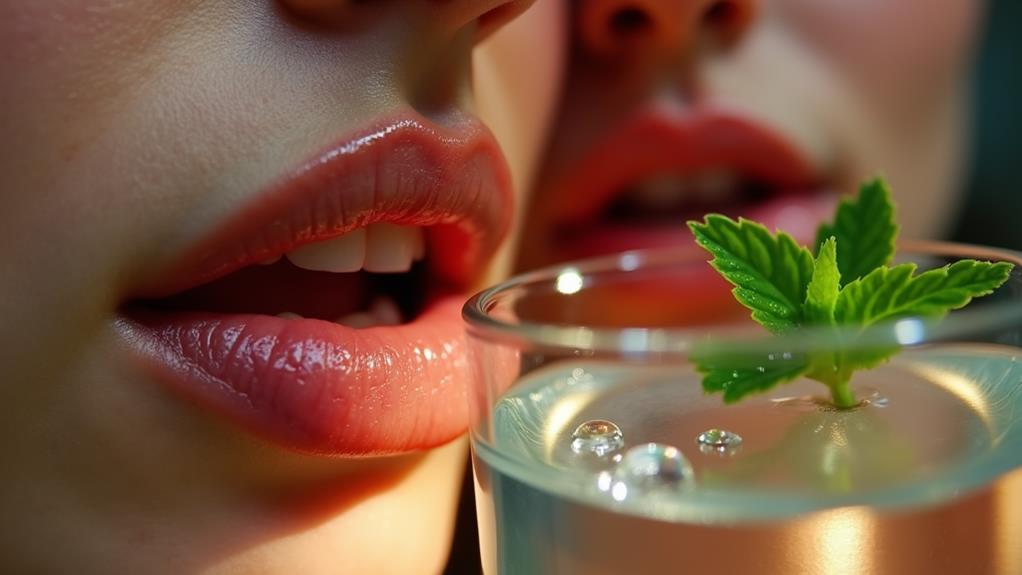Kissing After Poppers: The Chemical Taste That Could Turn Your Stomach
Kissing after using poppers can result in an unpleasant chemical taste and potential discomfort for both partners. This is because of the lingering effects of alkyl nitrites in the mouth and respiratory system. The chemical compounds in poppers can interact with taste receptors, causing a prolonged sensation of numbness and altered flavor perception. Although temporary, this experience can be off-putting and may impact intimate moments. Various methods exist to minimize the aftertaste, including consuming acidic foods, chewing gum, or drinking water. Nevertheless, these solutions only provide temporary relief. Understanding the underlying mechanisms and exploring safer alternatives can improve intimate experiences without unwanted side effects.
The Chemistry of Poppers

Poppers primarily consist of alkyl nitrites, a class of chemical compounds with the general formula R-ONO, where R represents an alkyl group. These volatile substances are typically inhaled for their rapid onset of psychoactive effects. The most common alkyl nitrites used in poppers include amyl nitrite, butyl nitrite, and isobutyl nitrite.
Regardless of users often believing manufacturers promote poppers for cleaning purposes, they are inhaled for their psychoactive effects.
The molecular structure of alkyl nitrites allows them to quickly enter the bloodstream through the lungs, causing a sudden drop in blood pressure and increased heart rate. This physiological response leads to feelings of euphoria, relaxation, and heightened sensations.
The chemical composition of poppers in addition contributes to their distinctive odor and taste, which can linger in the mouth and potentially affect the experience of kissing.
Understanding the chemistry of poppers is vital for users to make informed decisions about their use and potential interactions.
Health Risks and Concerns

Users of poppers should be aware of several health risks and concerns associated with their use. Inhalation of these volatile nitrites can lead to temporary drops in blood pressure, dizziness, and headaches.
More severe risks include methemoglobinemia, a condition that reduces oxygen transport in the blood. Poppers safety is vital, as improper use or accidental ingestion can cause chemical burns or poisoning.
Users have reported adverse effects such as Popper Maculopathy, which can lead to vision impairment and light sensitivity.
When it comes to kissing hygiene after popper use, it's important to reflect on the residual chemicals in the mouth and on the lips. These can potentially transfer to a partner, causing irritation or adverse reactions.
Furthermore, the chemical taste left behind may be unpleasant or nauseating for some individuals. Users should contemplate rinsing their mouths thoroughly and allowing time for the effects to dissipate before engaging in intimate activities to minimize these risks.
Taste Lingering Mechanisms

The persistence of taste after poppers use can be attributed to several physiological mechanisms. Poppers, containing volatile alkyl nitrites, can leave residual chemicals in the oral cavity and nasal passages. These compounds interact with taste receptors and olfactory neurons, prolonging the sensation of a chemical taste.
In some cases, lingering sensations, such as tongue numbness, may likewise contribute to the extended perception of the chemical flavor. Taste perception is closely linked to sensory memory, which can extend the experience of an unpleasant flavor. The brain's interpretation of these chemical signals may continue even after the substance has been metabolized.
Moreover, poppers can cause temporary drying of the mouth, altering saliva production and composition, which further impacts taste perception.
For individuals within the poppers-using community, understanding these lingering taste mechanisms can help manage expectations and reduce anxiety about the duration of the aftertaste, nurturing a sense of shared experience and belonging.
Minimizing the Aftertaste

Given the persistent nature of the poppers aftertaste, various strategies can be employed to minimize its impact. Flavor masking techniques and aftertaste remedies can help users mitigate the lingering chemical taste. Chronic use of poppers has been linked to irreversible brain damage, which highlights the importance of understanding potential health risks.
Common methods include:
- Consuming acidic foods or beverages
- Chewing sugar-free gum
- Brushing teeth and using mouthwash
- Drinking water or herbal tea
These approaches aim to neutralize or overpower the residual taste, providing relief for those affected.
It's important to note that although these methods may offer temporary relief, they do not address the underlying chemical reactions occurring in the mouth and nasal passages. For ideal results, users should combine multiple strategies and allow sufficient time for the body to naturally process and eliminate the chemical compounds.
Always consult a healthcare professional for personalized advice on managing poppers-related side effects.
Alternative Intimacy Enhancers

Considering the potential risks associated with poppers, many individuals seek safer alternatives to improve intimacy and sexual experiences. Several options exist that can boost sensations and create a more pleasurable atmosphere without the chemical effects of poppers.
Scented oils and vital oil diffusers can create a relaxing ambiance, promoting arousal and reducing anxiety. These natural fragrances can stimulate the olfactory senses, improving overall sensory experiences.
Flavored lubricants offer a tasty alternative that can make oral activities more enjoyable while also providing necessary lubrication. Other options include massage oils, feathers for sensory play, and mood lighting.
Communication between partners about desires and boundaries is fundamental for exploring these alternatives. By focusing on natural stimulants and sensory experiences, couples can create intimate moments that are both safe and satisfying, nurturing a deeper connection without relying on potentially harmful substances.
Moreover, users report that these alternatives do not cause the respiratory issues associated with poppers, making them a healthier choice for long-term use.
Call Us To Assist You
The use of alkyl nitrites as recreational inhalants carries significant health risks and produces unpleasant chemical aftertastes. These lingering effects can interfere with intimate activities like kissing. Proper education on the dangers, exploration of safer alternatives, and improved hygiene practices may mitigate negative consequences. In the end, pursuing intimacy improvement through chemical means requires careful consideration of potential harms versus perceived benefits. Individuals seeking to optimize romantic encounters should prioritize natural methods and open communication with partners.


